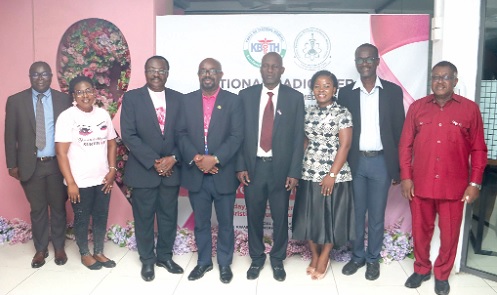Specialists have come up with an alternative breast cancer treatment different from the removal of the breast.
Known as breast conserving therapy, it keeps the breast in its normal shape and form, as opposed to the breast removal treatment known in medical science as mastectomy.
The alternative, which is said to have a lower recurrence rate as compared to the mastectomy that is very common in Ghana, involves the removal of the lump from the breast and then following it up with radiotherapy.
A Consultant Oncologist at the National Radiotherapy Oncology and Nuclear Medicine Centre of the Korle Bu Teaching Hospital, Professor Joel Yarney, who disclosed this has, therefore, advised people who detect lumps in their breasts not to allow fear of losing their breasts if they were proven to be breast cancer, to stop them from seeking care as that rather increases the chances of the breast being removed.
“One of the reasons why patients come in late, even after noticing the lump in the breasts early, is fear of losing their breasts because the commonest treatment for breast cancer in Ghana is removal of the breast.”
“We have done research and identified that this is one of the reasons why patients still come in late.”
“However, the message we are giving is that you can remove just the lump, and not the whole breast.”
“Studies have found that if you remove the lump and then do whole breast radiotherapy, the results are even better than removing the breast.
That is what we call breast conserving therapy, meaning breast conserving surgery plus radiotherapy”.
Prof. Yarney was speaking at a public lecture held on the theme, “Treat it early, preserve the breast,” organised by the centre to mark Pink October.
Situation
The Consultant Oncologist said even though the breast conserving therapy had been in existence for a long time, it was more common in advanced countries that used it as treatment for breast cancer compared to the mastectomy.
He said as compared to the western world, where most breast cancer patients were in their 60s, in Ghana, the peak age was between 40 to 49 years, which was the reason why most patients were affected more and delayed in seeking help.
The Chief Executive Officer of the KBTH, Dr Yakubu Seidu Adam, said the fight against breast cancer was not one that the health sector could win alone, adding that it demanded a collective effort from policy makers, community leaders, media advocates, families and individuals.
“Together, we must break the silence, dispel the myths and encourage regular screening and prompt medical attention,” he advised.
During a panel discussion on the theme, a consultant radiologist at the centre, Professor Yaw Boateng-Mensah, called for more public health facilities in the country to have mammogram equipment fixed there to enable more women to be diagnosed early and get treatment for breast cancer.
A breast cancer survivor who underwent the breast conserving therapy, Joycelyn Yaokuma, advised that telecommunication companies in the country should be engaged to send reminder messages, just as they do for birthdays, to customers who turn 40 to go for regular medical screening for conditions such as breast cancer to enable early diagnosis and treatment.
A surgeon, Professor Joe-Nat Clegg Lamptey, said even though they were now seeing very early cases of breast cancer with some having very small lumps, they were unfortunately still seeing quite a lot of late cases.

